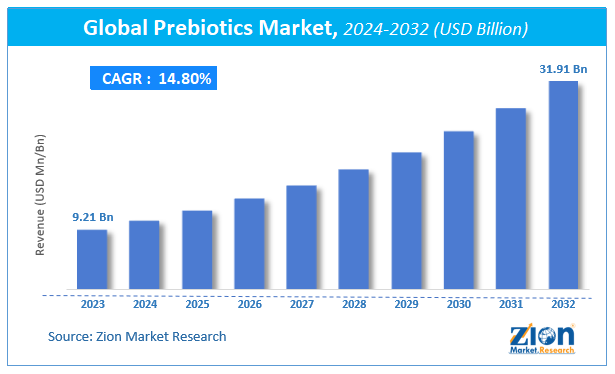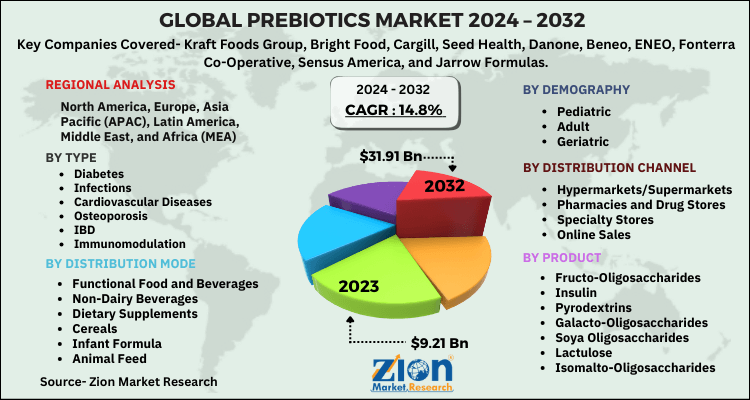Prebiotics Market Size, Share, Trends, Growth 2032

Prebiotics Market By Product (Fructo-Oligosaccharides, Insulin, Pyrodextrins, Galacto-Oligosaccharides, Soya Oligosaccharides, Lactulose, Isomalto-Oligosaccharides, and Others), By Disease Type (Diabetes, Infections, Cardiovascular Diseases, Osteoporosis, IBD, Immunomodulation, and Others), By Demography (Pediatric, Adult, and Geriatric), by Distribution Mode (Functional Food & Beverages, Non-Dairy Beverages, Dietary Supplements, Cereals, Infant Formula, and Animal Feed), and By Distribution Channel (Hypermarkets/Supermarkets, Pharmacies and Drug Stores, Specialty Stores, and Online Sales), And By Region - Global And Regional Industry Overview, Market Intelligence, Comprehensive Analysis, Historical Data, And Forecasts 2024 - 2032
| Market Size in 2023 | Market Forecast in 2032 | CAGR (in %) | Base Year |
|---|---|---|---|
| USD 9.21 Billion | USD 31.91 Billion | 14.8% | 2023 |
Prebiotics Industry Perspective:
The global prebiotics market size was worth around USD 9.21 Billion in 2023 and is predicted to grow to around USD 31.91 Billion by 2032 with a compound annual growth rate (CAGR) of roughly 14.8% between 2024 and 2032.
The study includes drivers and restraints of the prebiotics market along with the impact they have on the demand over the forecast period. Additionally, the report includes the study of opportunities available in the prebiotics market globally.
Prebiotics Market: Growth Drivers
Prebiotics are dietary ingredients used for enhancing all the beneficial components present in indigenous gut microbiota. Dietary fibers in prebiotics work as carbon sources for secondary and primary fermentation trails in the colon backing the digestive health in numerous ways. The concept of prebiotics was developed in the 1990s by Gibson and Roberfroid. The increasing consumer interest in dieting for better overall health has increased the awareness about prebiotics, which is propelling the global prebiotics market.
Moreover, technological revolution, development of new products, and the rising number of health-conscious consumers are major growth drivers of the prebiotics market. Nowadays, approximately 60% of food items, such as biscuits, bread, yogurt, and cereals, contain probiotics or prebiotics. Prebiotics are also present in natural food items like onion, garlic, banana, and leek. Prebiotics help the body to fight against many diseases like diabetes, osteoporosis, etc.
The global prebiotics market is likely to witness notable growth in the years ahead, owing to the rising prevalence of diseases like diabetes, infections, IBD, immunomodulation, etc. and growing government funding for the discovery and development of new food products.
Additionally, the increasing consumer concerns about the effectiveness of prebiotics and preventive healthcare is further propelling the prebiotics market growth globally. The prebiotic market is also experiencing substantial growth, owing to the growing awareness of low-calorie consumable products and their associated health benefits. The demand for prebiotics has also increased due to the increasing consumption of functional foods, which have positive effects on health apart from just providing basic nutrition.
In order to give the users of this report a comprehensive view of the prebiotics market, we have included a competitive landscape and an analysis of Porter’s Five Forces model for the market. The study encompasses a market attractiveness analysis, wherein all the segments are benchmarked based on their market size, growth rate, and general attractiveness.
The report provides company market share analysis to give a broader overview of the key players in the market. In addition, the report also covers key strategic developments of the market including acquisitions & mergers, new product launches, agreements, partnerships, collaborations & joint ventures, research & development, and regional expansion of major participants involved in the market on a global and regional basis.
Prebiotics Market: Segmentation
The study provides a decisive view of the prebiotics market by segmenting it based on the product, disease type, demography, distribution mode, distribution channel, and region.
Based on product, the market includes fructo-oligosaccharides, insulin, pyrodextrins, galacto-oligosaccharides, isomalto-oligosaccharides, soya oligosaccharides, lactulose, and others.
On the basis of disease type, the prebiotics market is divided into diabetes, infections, cardiovascular diseases, osteoporosis, IBD, immunomodulation, and others.
By demography, the market includes pediatric, adult, and geriatric.
By distribution mode, the prebiotics market comprises functional food and beverages, non-dairy beverages, dietary supplements, cereals, infant formula, and animal feed.
The distribution channel of the market is classified into hypermarkets/supermarkets, pharmacies and drug stores, specialty stores, and online sales.
Prebiotics Market: Report Scope
| Report Attributes | Report Details |
|---|---|
| Report Name | Prebiotics Market |
| Market Size in 2023 | USD 9.21 Billion |
| Market Forecast in 2032 | USD 31.91 Billion |
| Growth Rate | CAGR of 14.8% |
| Number of Pages | 120 |
| Key Companies Covered | Kraft Foods Group, Bright Food, Cargill, Seed Health, Danone, Beneo, ENEO, Fonterra Co-Operative, Sensus America, and Jarrow Formulas. |
| Segments Covered | By product, By disease type, By demography, By distribution mode, By distribution channel and By region |
| Regions Covered | North America, Europe, Asia Pacific (APAC), Latin America, Middle East, and Africa (MEA) |
| Base Year | 2023 |
| Historical Year | 2018 to 2022 |
| Forecast Year | 2024 - 2032 |
| Customization Scope | Avail customized purchase options to meet your exact research needs. Request For Customization |
Prebiotics Market: Regional Analysis
The regional segment includes the current and forecast demand for North America, Europe, Asia Pacific, Latin America, and the Middle East and Africa.
European and North American regions contributed significantly to the global prebiotics market growth in the last few years, owing to the initiatives taken by the regional governments to encourage innovation and development in the field of prebiotics. Additionally, the Federation of European Nutrition Societies (FENS) has invested in various businesses related to nutritional foods and nutricosmetics, which is further contributing to the prebiotics market in these regions. The Asia Pacific prebiotics market is likely to register the highest growth rate in the future, owing to the increasing awareness of prebiotics and rising disposable income of the regional population.
Prebiotics Market: Competitive Analysis
The global prebiotics market is dominated by players like:
- Kraft Foods Group
- Bright Food
- Cargill
- Seed Health
- Danone
- Beneo
- ENEO
- Fonterra Co-Operative
- Sensus America
- Jarrow Formulas
This report segments the global prebiotics market into:
Global Prebiotics Market: Product Analysis
- Fructo-Oligosaccharides
- Insulin
- Pyrodextrins
- Galacto-Oligosaccharides
- Soya Oligosaccharides
- Lactulose
- Isomalto-Oligosaccharides
- Others
Global Prebiotics Market: Disease Type Analysis
- Diabetes
- Infections
- Cardiovascular Diseases
- Osteoporosis
- IBD
- Immunomodulation
- Others
Global Prebiotics Market: Demography Analysis
- Pediatric
- Adult
- Geriatric
Global Prebiotics Market: Distribution Mode Analysis
- Functional Food and Beverages
- Non-Dairy Beverages
- Dietary Supplements
- Cereals
- Infant Formula
- Animal Feed
Global Prebiotics Market: Distribution Channel Analysis
- Hypermarkets/Supermarkets
- Pharmacies and Drug Stores
- Specialty Stores
- Online Sales
Global Prebiotics Market: Regional Analysis
- North America
- The U.S.
- Europe
- UK
- France
- Germany
- Asia Pacific
- China
- Japan
- India
- Latin America
- Brazil
- Middle East and Africa
Table Of Content
Methodology
FrequentlyAsked Questions
Prebiotics are a form of dietary fiber that provide sustenance for beneficial bacteria in the gut. Unlike probiotics, which are live beneficial bacteria, prebiotics are non-digestible food components that stimulate the development and activity of beneficial bacteria in the digestive system.
The demand for prebiotic products is being driven by the increasing awareness of the advantages of a healthy gut microbiome and overall digestive health among consumers.
As the prevalence of digestive health issues, such as irritable bowel syndrome (IBS) and other gastrointestinal disorders, continues to increase, there is a growing demand for products that can assist in its management.
The global prebiotics market size was worth around USD 9.21 Billion in 2023 and is predicted to grow to around USD 31.91 Billion by 2032 with a compound annual growth rate (CAGR) of roughly 14.8% between 2024 and 2032.
The global prebiotics market a compound annual growth rate (CAGR) of roughly 14.8% between 2024 and 2032.
The regional segment includes the current and forecast demand for North America, Europe, Asia Pacific, Latin America, and the Middle East and Africa.
Some key players of the global prebiotics market are Kraft Foods Group, Bright Food, Cargill, Seed Health, Danone, Beneo, ENEO, Fonterra Co-Operative, Sensus America, and Jarrow Formulas.
RelatedNews
HappyClients
Zion Market Research
Tel: +1 (302) 444-0166
USA/Canada Toll Free No.+1 (855) 465-4651
3rd Floor,
Mrunal Paradise, Opp Maharaja Hotel,
Pimple Gurav, Pune 411061,
Maharashtra, India
Phone No +91 7768 006 007, +91 7768 006 008
US OFFICE NO +1 (302) 444-0166
US/CAN TOLL FREE +1 (855) 465-4651
Email: sales@zionmarketresearch.com
We have secured system to process your transaction.
Our support available to help you 24 hours a day, five days a week.
Monday - Friday: 9AM - 6PM
Saturday - Sunday: Closed






